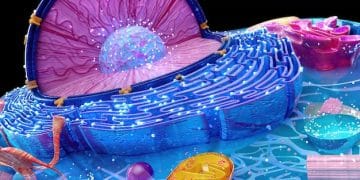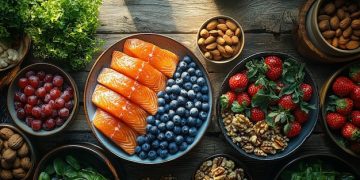Fuel Your Body: Eating for Energy & Optimal Performance

Fueling your body effectively for peak performance and sustained vitality involves a strategic understanding of nutrition, recognizing that food is not merely sustenance but a powerful source of energy that directly impacts physical, cognitive, and emotional well-being.
In our fast-paced world, the quest for sustained energy and optimal performance has become a cornerstone of a productive and fulfilling life. Far beyond mere calorie counting, understanding how to strategically fuel your body is a nuanced art. This comprehensive guide will explore the profound connection between nutrition and vitality, revealing practical strategies for Eating for Energy: How to Fuel Your Body for Optimal Performance and Vitality.
The Science of Energy Production: Beyond Calories
To truly grasp the concept of eating for energy, one must first delve into the fundamental science behind how our bodies generate and utilize energy. It’s not just about consuming calories; it’s about the quality and type of those calories and how they are metabolized. Every cell in our body requires energy to function, from thought processes to muscle contraction, and this energy primarily comes from the food we eat.
Macronutrients as Energy Sources
The primary energy producers are macronutrients: carbohydrates, proteins, and fats. Each plays a distinct role in our energy metabolism.
- Carbohydrates: Often viewed as the body’s preferred and most readily available source of energy, carbohydrates are broken down into glucose, which fuels our cells. Simple carbohydrates provide quick bursts, while complex carbohydrates offer sustained release.
- Proteins: While primarily known for building and repairing tissues, proteins can also be used for energy, particularly during prolonged periods of activity or when carbohydrate intake is insufficient.
- Fats: An incredibly dense energy source, fats provide a concentrated form of fuel, especially important for endurance activities and long-term energy reserves. Healthy fats are crucial for cellular function and hormone production.
The intricate dance between these macronutrients dictates our energy levels throughout the day. Imbalances can lead to energy crashes, fatigue, and diminished performance, underscoring the importance of a well-rounded dietary approach.
The Metabolic Pathways
Once ingested, these macronutrients undergo complex metabolic processes. Glucose from carbohydrates enters the bloodstream and powers cellular activities through glycolysis and cellular respiration. Fats are broken down into fatty acids and glycerol, which can also enter the metabolic pathways to produce ATP, the energy currency of the cell. Proteins are deaminated, and their carbon skeletons can be converted into glucose or fat for energy storage or immediate use.
This understanding forms the bedrock of strategic eating for energy. It highlights that sustained vitality isn’t just about eating more; it’s about eating smarter, choosing foods that optimize metabolic efficiency and provide a steady supply of fuel rather than erratic spikes and dips.
Optimizing Carbohydrate Intake for Sustained Energy
Carbohydrates are often misunderstood in the context of energy. While simple sugars can lead to rapid energy spikes followed by crashes, complex carbohydrates found in whole grains, vegetables, and legumes offer a steady and lasting energy supply. The key lies in strategic selection and timing.
Complex vs. Simple Carbohydrates
Complex carbohydrates, rich in fiber, are digested slowly, providing a gradual release of glucose into the bloodstream. This prevents the sharp insulin response that leads to energy dips. Examples include:
- Whole grains (oats, brown rice, quinoa, whole wheat bread)
- Legumes (lentils, beans, chickpeas)
- Starchy vegetables (sweet potatoes, corn, peas)
Conversely, simple carbohydrates, found in sugary drinks, pastries, and white bread, are quickly digested, causing a rapid rise and fall in blood sugar. While useful for immediate energy needs during intense exercise, they are generally detrimental for sustained energy throughout the day.
Timing Your Carbohydrate Consumption
The timing of carbohydrate intake can significantly impact energy levels. For sustained daily energy, complex carbohydrates should be a staple at most meals. For athletes or highly active individuals, strategically timed simple carbohydrates can be beneficial pre- and post-workout to fuel performance and aid recovery.
Incorporating a mix of fiber-rich carbohydrates with proteins and healthy fats further modulates glucose absorption, ensuring a more stable and prolonged energy release. This balanced approach helps prevent mid-afternoon slumps and maintains cognitive sharpness.

The Role of Protein in Energy and Satiety
While carbohydrates are primary fuel, protein plays a crucial supporting role in energy maintenance and overall vitality. It’s not just for muscle building; protein contributes to sustained energy by promoting satiety, stabilizing blood sugar, and supporting metabolic functions.
Protein’s Impact on Blood Sugar
Unlike carbohydrates, protein has a minimal impact on blood sugar levels. When consumed alongside carbohydrates, protein slows down the digestion and absorption of glucose, leading to a more gradual rise in blood sugar and a more stable energy curve. This helps prevent the energy crashes associated with high-glycemic meals.
Moreover, protein takes longer to digest, contributing to a feeling of fullness and reducing the likelihood of overeating or reaching for sugary snacks that can derail energy levels. This steady state of satiety and blood sugar regulation is vital for consistent performance.
Optimal Protein Sources
Incorporating a variety of high-quality protein sources throughout the day is essential. These can include:
- Lean meats (chicken, turkey, lean beef)
- Fish and seafood (salmon, tuna, cod)
- Eggs and dairy products (yogurt, cheese)
- Plant-based proteins (lentils, beans, tofu, tempeh, quinoa, nuts, seeds)
Distributing protein intake across meals, rather than consuming most of it in one sitting, also helps optimize its utilization for energy and muscle maintenance. This strategic approach ensures a steady supply of amino acids, supporting not only physical energy but also cognitive function.
Healthy Fats: Essential for Long-Term Energy and Brain Function
Healthy fats, once demonized, are now recognized as indispensable for sustained energy, hormone production, and optimal brain function. They are the most calorie-dense macronutrient, providing a concentrated and long-lasting fuel source.
Types of Healthy Fats
Not all fats are created equal. Focus on incorporating unsaturated fats and omega-3 fatty acids, while limiting saturated and avoiding trans fats.
- Monounsaturated fats: Found in olive oil, avocados, and nuts, these fats are heart-healthy and contribute to sustained energy release.
- Polyunsaturated fats: Include omega-3 and omega-6 fatty acids. Omega-3s, abundant in fatty fish, flaxseeds, and walnuts, are crucial for brain health, reducing inflammation, and supporting cellular energy.
- Medium-chain triglycerides (MCTs): Found in coconut oil, MCTs are unique in their ability to be rapidly absorbed and metabolized, providing a quick source of energy, particularly for the brain.
These healthy fats play a vital role in maintaining the integrity of cell membranes, facilitating nutrient absorption, and supporting hormone balance, all of which indirectly influence our energy levels and overall vitality.
Fats and Satiety
Like protein, healthy fats contribute significantly to satiety, helping to regulate appetite and prevent energy-sapping sugar cravings. Their slow digestion rate ensures a steady release of energy, making them an excellent choice for sustained activity and mental clarity.
Integrating healthy fats into every meal can help optimize overall energy balance. From adding avocado to a salad to cooking with olive oil or snacking on a handful of almonds, these small additions can make a substantial difference in maintaining consistent energy levels throughout the day.
Micronutrients and Hydration: The Unsung Heroes of Energy
While macronutrients provide the bulk of our energy, micronutrients (vitamins and minerals) and adequate hydration are the critical cofactors that enable efficient energy production at a cellular level. Their absence can lead to profound fatigue and diminished performance, even with sufficient macronutrient intake.
Key Micronutrients for Energy
Several vitamins and minerals are directly involved in energy metabolism:
- B Vitamins: Essential for converting food into energy. Deficiencies can lead to fatigue.
- Iron: Crucial for oxygen transport in the blood. Low iron levels (anemia) cause extreme tiredness.
- Magnesium: Involved in over 300 biochemical reactions, including energy production and muscle function.
- Vitamin D: While known for bone health, it also plays a role in energy levels and mood.
A diverse diet rich in fruits, vegetables, and whole grains ensures an adequate supply of these vital micronutrients. When dietary intake is insufficient, targeted supplementation, under professional guidance, may be considered.
The Indispensable Role of Hydration
Water is often overlooked as an energy booster, yet even mild dehydration can significantly impair physical and cognitive performance, leading to fatigue, headaches, and reduced concentration. Water is involved in every bodily process, including nutrient transport and waste removal.
Aim for at least eight glasses of water daily, increasing intake during exercise or hot weather. Consider incorporating electrolyte-rich fluids when engaging in prolonged physical activity to replenish essential minerals lost through sweat.Staying adequately hydrated is a simple yet profound way to maintain energy and vitality throughout the day, directly impacting metabolic efficiency.
Practical Strategies for Eating for Optimal Energy
Translating theoretical knowledge into daily practice is where the real transformation happens. Adopting practical strategies for meal planning, food preparation, and mindful eating can significantly improve energy levels and overall well-being.
Balanced Meals and Snacks
The cornerstone of eating for energy is constructing balanced meals that include a mix of complex carbohydrates, lean protein, and healthy fats. This macronutrient synergy ensures sustained energy release and satiety.
- Breakfast: Start strong with a meal that balances all three macros, like oatmeal with berries, nuts, and a scoop of protein powder, or eggs with whole-grain toast and avocado.
- Lunch: Opt for a colorful salad with grilled chicken or chickpeas, plenty of vegetables, and a healthy dressing, or a wrap with lean protein and whole grains.
- Dinner: Focus on lean protein, a generous portion of non-starchy vegetables, and a moderate portion of complex carbohydrates like quinoa or sweet potato.
Strategically placed snacks, such as a handful of almonds, an apple with peanut butter, or Greek yogurt, can bridge gaps between meals, preventing excessive hunger and energy dips.
Mindful Eating and Portion Control
How we eat is almost as important as what we eat. Mindful eating—paying attention to hunger and fullness cues, savoring food, and eating without distraction—can enhance digestion and nutrient absorption, indirectly boosting energy. Portion control prevents overeating, which can leave you feeling sluggish.
Avoiding processed foods, excessive sugar, and artificial ingredients is also critical. These items often provide empty calories that deplete rather than support true energy. Focus on whole, unprocessed foods as close to their natural state as possible.

The Gut-Energy Connection: Probiotics and Fiber
Emerging research has highlighted the profound connection between gut health and overall energy levels. A thriving gut microbiome, supported by a diet rich in fiber and probiotics, plays a pivotal role in nutrient absorption, immune function, and even mood regulation, all of which contribute to sustained vitality.
Our gut hosts trillions of microorganisms, collectively known as the gut microbiota. This complex ecosystem influences how efficiently we extract nutrients from food and produce certain vitamins, like some B vitamins (essential for energy) and vitamin K. An imbalance in this microbiota, often termed dysbiosis, can lead to digestive issues, inflammation, and even fatigue.
Fiber: Fuel for Your Gut Microbes
Dietary fiber, particularly soluble fiber, acts as a prebiotic, feeding the beneficial bacteria in your gut. As these bacteria ferment fiber, they produce short-chain fatty acids (SCFAs) like butyrate, which serve as an energy source for colon cells and have systemic anti-inflammatory effects.
Good sources of fiber include:
- Whole grains
- Fruits (especially with skin)
- Vegetables
- Legumes
- Nuts and seeds
Adequate fiber intake supports regular bowel movements, detoxification, and a healthy gut environment, all contributing to better nutrient absorption and enhanced energy.
Probiotics: Replenishing Good Bacteria
Probiotics are live microorganisms that, when consumed in adequate amounts, confer a health benefit to the host. They help replenish and diversify the gut microbiota, which can improve digestion, strengthen the immune system, and potentially enhance energy levels by reducing inflammation and supporting nutrient assimilation.
Incorporate probiotic-rich foods into your diet, such as:
- Yogurt with live and active cultures
- Kefir
- Kombucha
- Sauerkraut
- Kimchi
By nurturing your gut health through a fiber-rich diet and incorporating probiotic foods, you are not only supporting digestive wellness but also creating an optimal internal environment for sustained energy and vitality.
Navigating Dietary Challenges and Individual Needs
While general principles of eating for energy apply broadly, individual needs, dietary restrictions, and lifestyle factors require a personalized approach. What works for one person might not work for another, and adapting strategies to unique circumstances is key to sustainable success.
Addressing Food Sensitivities and Allergies
Undiagnosed food sensitivities or allergies can be significant energy drainers. Reactions to certain foods, even mild ones, can trigger inflammation, digestive distress, and chronic fatigue. Common culprits include gluten, dairy, soy, and certain nuts.
If you suspect a food sensitivity, working with a healthcare professional or registered dietitian to identify and eliminate trigger foods can lead to remarkable improvements in energy levels and overall well-being. An elimination diet, followed by careful reintroduction, is often the most reliable method.
Special Dietary Considerations
Vegetarian, vegan, and other specialized diets require careful planning to ensure adequate intake of all essential nutrients for sustained energy. For example, plant-based diets need to pay particular attention to sources of iron, B12, omega-3 fatty acids, and zinc, which are more readily available in animal products.
Pregnant women, athletes, and individuals with chronic health conditions also have unique nutritional demands. Consulting with a nutritionist or dietitian can help tailor a dietary plan that meets these specific requirements, preventing deficiencies that could lead to low energy.
The Importance of Bio-Individuality
Ultimately, eating for energy is a deeply personal journey. Factors such as genetics, metabolism, activity level, stress, and sleep patterns all play a role in how our bodies respond to food. What provides boundless energy for one person might cause discomfort for another.
This emphasizes the importance of listening to your body, observing how different foods affect your energy levels, mood, and digestion, and being willing to experiment within healthy parameters to discover what truly fuels your optimal performance and vitality. Continuous learning and adaptation are crucial for long-term success.
| Key Principle | Brief Description |
|---|---|
| 🍎 Balanced Plate | Combine complex carbs, lean proteins, and healthy fats at each meal for stable energy release. |
| 💧 Stay Hydrated | Drink plenty of water throughout the day; even mild dehydration impacts energy and focus. |
| 🌿 Gut Health | Support your gut with fiber and probiotics for better nutrient absorption and overall vitality. |
| ⬆️ Micronutrient Power | Ensure adequate intake of vitamins and minerals vital for cellular energy production. |
Frequently Asked Questions About Eating for Energy
▼
For sustained energy, focus on complex carbohydrates such as whole grains (oats, quinoa, brown rice), legumes (beans, lentils), and starchy vegetables (sweet potatoes, corn). These are digested slowly, providing a steady release of glucose into the bloodstream, which helps prevent energy crashes.
▼
Protein contributes to energy by promoting satiety and stabilizing blood sugar. It slows down the absorption of carbohydrates, leading to a more gradual rise in blood glucose and preventing sharp peaks and valleys. This helps you feel fuller for longer and maintains consistent energy throughout the day.
▼
Yes, healthy fats are crucial for long-term energy and brain function. They are calorie-dense and provide a concentrated, sustained fuel source. Focus on monounsaturated fats (olive oil, avocados), polyunsaturated fats like omega-3s (fatty fish, flaxseeds), and consider MCTs (coconut oil) for quick brain fuel.
▼
Absolutely. Even mild dehydration can significantly impair physical and cognitive performance, leading to feelings of fatigue, headaches, and decreased concentration. Water is vital for nutrient transport, waste removal, and all metabolic processes involved in energy production. Staying well-hydrated is fundamental.
▼
Your gut health is profoundly linked to energy. A balanced gut microbiome aids in efficient nutrient absorption, produces essential vitamins (like B vitamins), and influences immune function and mood. A diet rich in fiber and probiotics supports a healthy gut, enhancing overall vitality and energy production.
Conclusion
Embracing a lifestyle of eating for energy is not a mere dietary fad; it is a fundamental shift toward optimizing your body’s intrinsic ability to thrive. By understanding the intricate interplay of macronutrients, micronutrients, hydration, and gut health, you empower yourself to unlock sustained vitality and peak performance. It’s a continuous journey of learning and adaptation, prioritizing whole, nutrient-dense foods and listening attentively to your body’s unique signals. This deliberate and informed approach to nutrition holds the key to not just performing well, but truly living well.





